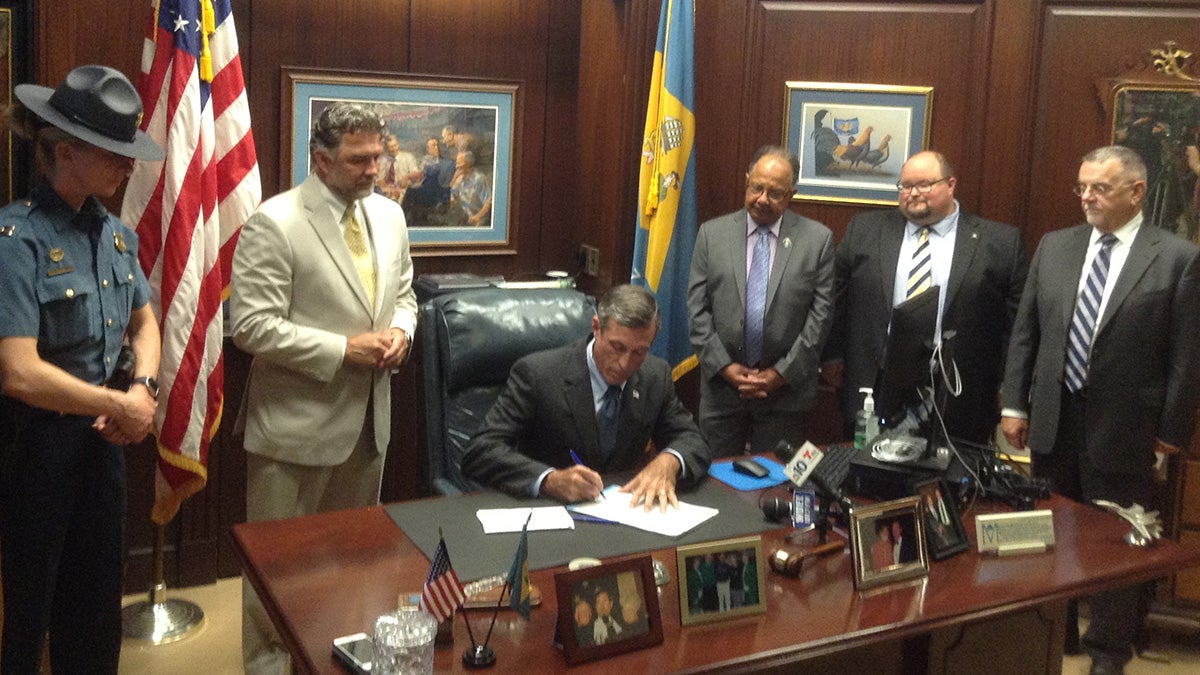Gov. Carney signs legislation to reduce illicit massage businesses

Gov. Carney signed a bill that aims to reduce illicit massage businesses. (Zoë Read/WHYY)
Gov. John Carney, D-Delaware, signed a bill Wednesday that aims to prevent the trafficking of women for sexual exploitation at illicit massage businesses.
The legislation, sponsored by State Rep. Bryon Short, D-Highland Woods, allows Delaware’s Division of Professional Regulation to inspect massage businesses without notice or concurrent criminal investigation—as it currently does with hair salons and barbershops.
The bill also directs the oversight of message businesses to the Board of Massage and Bodywork, allowing it to grant or deny licensure. Individuals operating a massage business without a licence can face various penalties, such as a fine or imprisonment.
“When I saw we were signing a bill like this I thought how important these services are in our state and how important it is to keep them above board and within the law,” Carney said.
There have been several civil cases, nuisance cases and arrests at illicit massage businesses throughout the state—and many other illicit massage businesses still operate.
Law enforcement receives complaints about illicit massage businesses, and it also searches for them on Craigslist and Backpage.
The exact cause of the increase of illicit massage businesses in Delaware is unknown, but it’s suspected they began increasing in volume after Delaware removed “massage establishment” from the definition of an adult entertainment establishment in 2009, according to the DOJ.
Most of the women are trafficked overseas, often in China and Korea, and smuggled into the U.S.—often into Flushing in Queens, NY—on temporary work visas or tourist visas.
In Delaware, the businesses usually are located in strip malls, shopping centers and other mainstream retail areas, according to the DOJ. The women usually live in the businesses, often in deplorable conditions. They’re not allowed to leave, and many would not be successful if they attempted to leave, as they often don’t speak English or even know where they are. The majority of income they earn from performing sex acts is directed back to the trafficker operating the business.
Short became interested in the issue a couple years ago, when he learned how many illicit businesses were located in his area. He educated himself on the issue of sex trafficking at illicit massage businesses, and started work on legislation.
“My ultimate goal is, because of this legislation, human trafficking is significantly reduced in our state,” Short said. “I think through the process of doing the bill we’ve raised awareness, and awareness I didn’t have two years ago, but as it plays out I want to reduce human trafficking, reduce the victimization of people in our state.”
He said the DPR also is working on ways to better help victims of trafficking at illicit massage businesses, like creating cards with messages in various languages so women who don’t speak English can communicate with them.
DPR director David Mangler said he believes the legislation will make it easier for the agency and law enforcement to track down traffickers.
“This law allows us to look for other things other than licences to make sure appropriate records are being kept, that they conform with the ethical standards of legitimate massage practitioners, allow us to make certain the place has the required business licence from the Division of Revenue and allows us to look for signs of any illegal activity that we would be able to refer to local or state law enforcement,” he said.
WHYY is your source for fact-based, in-depth journalism and information. As a nonprofit organization, we rely on financial support from readers like you. Please give today.


